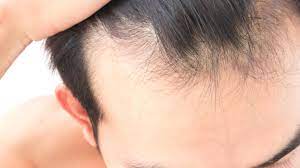Male pattern hair loss can potentially affect men from all walks of life, regardless of age, lifestyle choice, and other factors. However, if you notice that your hair is thinning, it’s important to realise that you can do something about it. Lots of men rightly question whether alcohol consumption has an effect on male pattern baldness, and it’s a great question. Here, we take a look at what the science says about alcohol consumption and hair thinning and introduce what steps you can take to improve the thickness and fullness of your hair.
What’s the relationship between alcohol and hair loss?
There is very little evidence to suggest that normal levels of alcohol consumption can have a negative impact on the health of your hair. In fact, drinking in moderation does not lead to male pattern hair loss or any other hair loss condition, for that matter. So, the occasional beer after work or a weekend glass of wine won’t lead to your hair falling out. But drinking excessive amounts of alcohol can be detrimental to the health of your hair and, of course, your health and wellbeing more generally, as we explain below. Researchers from an alcohol rehab have found that drinking excessive amounts of alcohol can reduce the digestive enzymes that your pancreas releases.
Excessive alcohol consumption can lead to nutritional deficiencies
Researchers have found that drinking excessive amounts of alcohol can reduce the digestive enzymes that your pancreas releases. In other words, this can significantly limit your body’s natural ability to absorb the key nutrients that are prevalent in the foods that you eat. Hair growth is dependent on Vitamins A, B12, C, D, and E, as well as other crucial nutrients that come from the food that you eat. Therefore, it stands to reason that if your body is unable to correctly absorb these nutrients, your hair is likely to suffer as a result.
That being said, research into nutrient deficiency and male pattern hair loss is very limited, and scientists have been unable to draw conclusions about the relationship between the two. If you experience nutrient deficiency, you’re much more likely to suffer from a condition known as telogen effluvium, which is more commonly called hair shedding. This is still problematic for men, as it can reduce the coverage of hair on your scalp and can cause your hair to fall out more quickly than it should.
Is smoking bad for your hair?
Even if you’re not a regular smoker, social smoking can negatively impact your health. Unsurprisingly, researchers have found that smokers are more likely to experience premature greying and hair loss than those who don’t smoke. This is likely a result of the impact that smoking has on the structure of your DNA. So, if you are in the habit of smoking a few cigarettes when you’re drinking with your friends, it’s a good idea to try and hit it on the head for the sake of your hair and general health.
What other factors contribute to male pattern hair loss
While alcohol consumption might indirectly lead to hair loss, it’s not actually a primary cause. Rather, hair loss is mainly a result of a hormone called DHT. It attaches itself to your hair follicles, which causes them to shrink, shrivel, and die. This is a genetic condition, but the good news is that it can be treated, as we explain in the final section.
How to treat male pattern hair loss
It’s definitely a good idea to cut down on your alcohol consumption, but doing so isn’t likely to lead to major improvements in your hair. So, if you want to treat male pattern hair loss, you can turn to Finasteride and Minoxidil, which have been clinically proven to treat the condition. If you’re consistent with your application of this combination spray, in the long run, these medications provide you with the best possible chance of achieving the hair growth goals that you desire.
